Miracles & Madonnas in Italia:
July 2017
The most impressive Madonna I visited in Italy was in a small village called Ivrea in the Piedmont Region of the Italian Alps (situated
between Milan and Turin, near the border of Switzerland and Italy).
The story of the Madonna of Ivrea goes back
to 1859, when a family in Northern Italy needed money. To remedy the
situation, they sold some of their furniture, including a picture of the Virgin
Mary painted on wood. The new owners of the painting decided they no
longer wanted the painting. So, they tried to break it with an ax. It would not break. So, they threw the piece of
wood into a fire. It would not burn. While the edges burned delicately around
the image (see photo below), the painting of the Virgin Mary would not
burn. Determined at this point, the owners doused the painting in alcohol
and set it afire. Once again, the Madonna would not burn.
The Miraculous Madonna of Ivrea
(Madonna on Wood Preserved When Twice-Burned and Once-Hatcheted!):
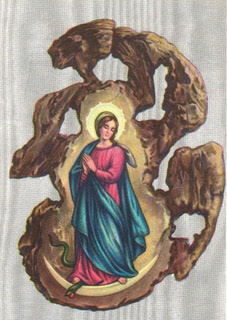
Frightened by this series of miracles, the new owners of the Madonna
went to their priest. He counselled them to give the painting to "someone
who could pray for them." They gave the painting to the Church of the
Immaculate Conception in Ivrea (in the Italian Alps
near the Italo-Swiss border), where it remains to
this day.
When we visited the church that houses the Madonna of Ivrea,
also known as the "Madonna of Miracles," there were about a dozen
nuns praying at the foot of the image. As the vibrations of their prayers
filled the church, the air was so still and quiet, and charged with the
power of their devout prayers, I thought it may have been one of the
holiest places I'd visited in Italy.
We prayed and meditated along with the nuns, and I experienced a stillness
and peace equal to that of any of my deepest meditations. To me, this was a
priceless gift that I will forever refer back to if I'm struggling with
restlessness in meditation. In sitting with these nuns I had the
impression they were so immersed in prayer that they were barely breathing, or
had even entered a breathless state. It demonstrated to me the power of
devotion and of loving concentration on a single point.
***
Another awe-inspriring Madonna is found at the
Sanctuary of the Madonna of San Luca (named for Saint Luke the Evangelist), on
a high hill in Bologna, in northeastern Italy. This
Madonna is said to have performed the "miracle of the
rain." In the 15th century, torrential rains threatened to
destroy the crops in this northeastern Italian town.
The townspeople decided to form a procession with the Madonna of San Luca (see
photo below), which is said to have been painted by the apostle Luke.
It was brought to Bologna from a basilica in Constantinople in
the 1100s. As soon as the procession began, the rain stopped. And
every year, to this day, a procession is held to honor the Madonna of San Luca. Locals told us that it will rain just a little at
the time of the procession and then the sun will return.
Madonna of San Luca in Bologna, Italy
(Painted by Luke the Evangelist):
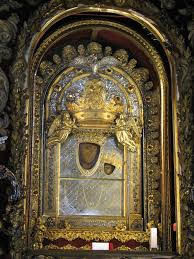
***
Another impressive site of miracles is at the Sanctuary of Oropa in the Italian Alps, which is dedicated to the Black Madonna of Oropa. (see photo below)
What was so impressive to me was the hall near the sanctuary that was filled
from floor to ceiling with testimonials of people who had prayed to the Black
Madonna of Oropa and had experienced miraculous
healings or had been spared from perilous circumstances. As far as the eye
could see, there were letters, drawings, and photos of people who described
recovering from terminal illnesses, falling from a roof or other high place
without harm, surviving normally fatal car crashes, finding lost children,
or thieves returning stolen goods.
It proved to me that the power of prayer and faith can manifest
miracles!
Black Madonna of Oropa (Piedmont Region of Italian
Alps)
Miraculous Healings:
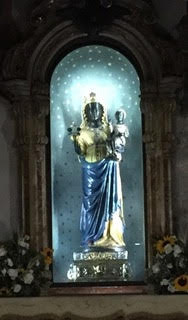
***
Another awe-inspiring Madonna can be found in Livorno, Italy, on the West
Coast of Italy, near the Ligurian Sea
Madonna of Montenero in Livorno, Italy:
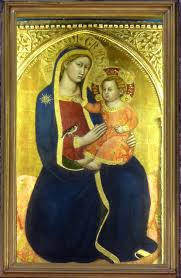
Prayers to the Madonna of Montenero have brought
about many miracles, attested to through the many cards and letters displayed
in a hall similar to the one at the Sanctuary of Oropa (No wonder Italians have a fervent belief in the power of miracles. By the
abundance of letters attesting to miracles everyday people
have experienced, one assumes that miracles are quite commonplace!)
The only difference between the "hall of miracles" at the Sanctuary
of Montenero in Livorno, and the Sanctuary of Oropo in the Italian Alps, is that the testimonials
of miracles at Montenero not only cover floor to
ceiling of one hallway, but also go up a staircase to a second floor!
Through the intercession of the Madonna of Montenero,
tradition holds that the city was saved from an earthquake in the 15th
century. A miraculous wind also saved the city from an invasion by
the Roman Emperor Maximillian I in the late 15th century. And the city was
spared from a plague in 1720. The Madonna also is credited with saving a
sinking ship off the coast in 1750.
***
The story of this last Madonna is quite interesting. It was painted
on a stucco wall on the outside of a home, which was the custom at the
time, in Trevi, Italy (near Rome). Several years
after it was painted, local villagers noticed that tears were flowing from the
eyes of the Madonna. They appeared to be tears of blood. People flocked from
far and wide to witness this miracle. Again, many documented miracles occurred
to those who prayed to the image.
The image of the Madonna was eventually cut from the side of the house to
preserve it from the elements and placed in a larger church in Trevi, Italy. (see photo
below)
Madonna of Tears
Madonna that Shed Tears of Blood in 1485 (was painted on the side of a
home in Trevi, Italy):
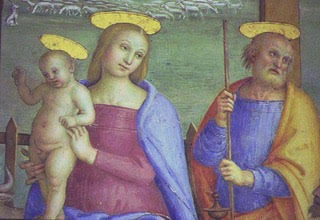
***
These stories are just a few of the hundreds of sites of devotion and
miraculous events you can witness throughout Italy. These events deeply moved
me with the energy of so many people's faith and devotion.
It also was so awe-inspiring to witness not only the site of miraculous
events, but the ubiquitous religious art throughout Italia attesting to
these miracles. I was continually struck by the thought that many, many people
had taken the time and energy, many centuries ago, to construct
relatively permanent testaments to their love of the divine. And they placed
it in virtually every empty space, even on the side of a house, as
evidenced by the miraculous painting above.
I found myself asking myself--and others--how could these elaborate
churches, made of heavy stone and marble, have been constructed in the
1300s, 1400s, and 1500s, when they had no machines or even sophisticated
tools. Further, these magnificent edifices are filled with large and heavy
pieces of ceramic artwork that remains completely intact more than 500 years
later.
Here are a few examples of the heavy ceramic pieces crafted by Andrea della Robbia more than 500
years ago, and found not only in churches, but on the outside of
buildings throughout Italy, especially in Florence:
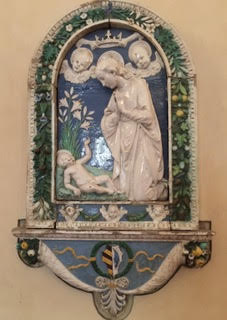
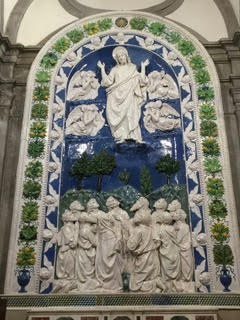
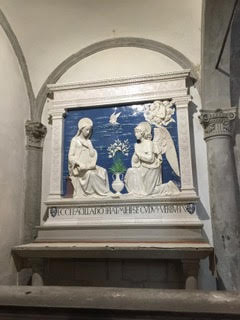
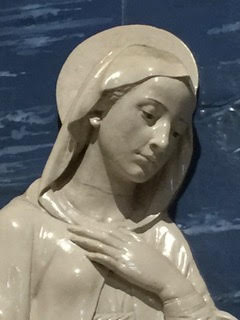
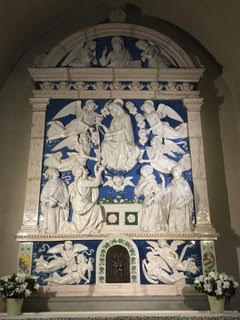
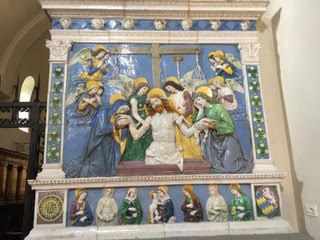
The answer I routinely got from the
Italian "experts" was that divine intervention had made these
works of art and architecture possible. The other answer I got was: "Why
do you Americans build your homes of wood when it breaks down so quickly? Why
don't you make your homes of stone, like we do?" There may be something to
that, as homes in Italy that date back to the 1200s are still in active use!
-OM-